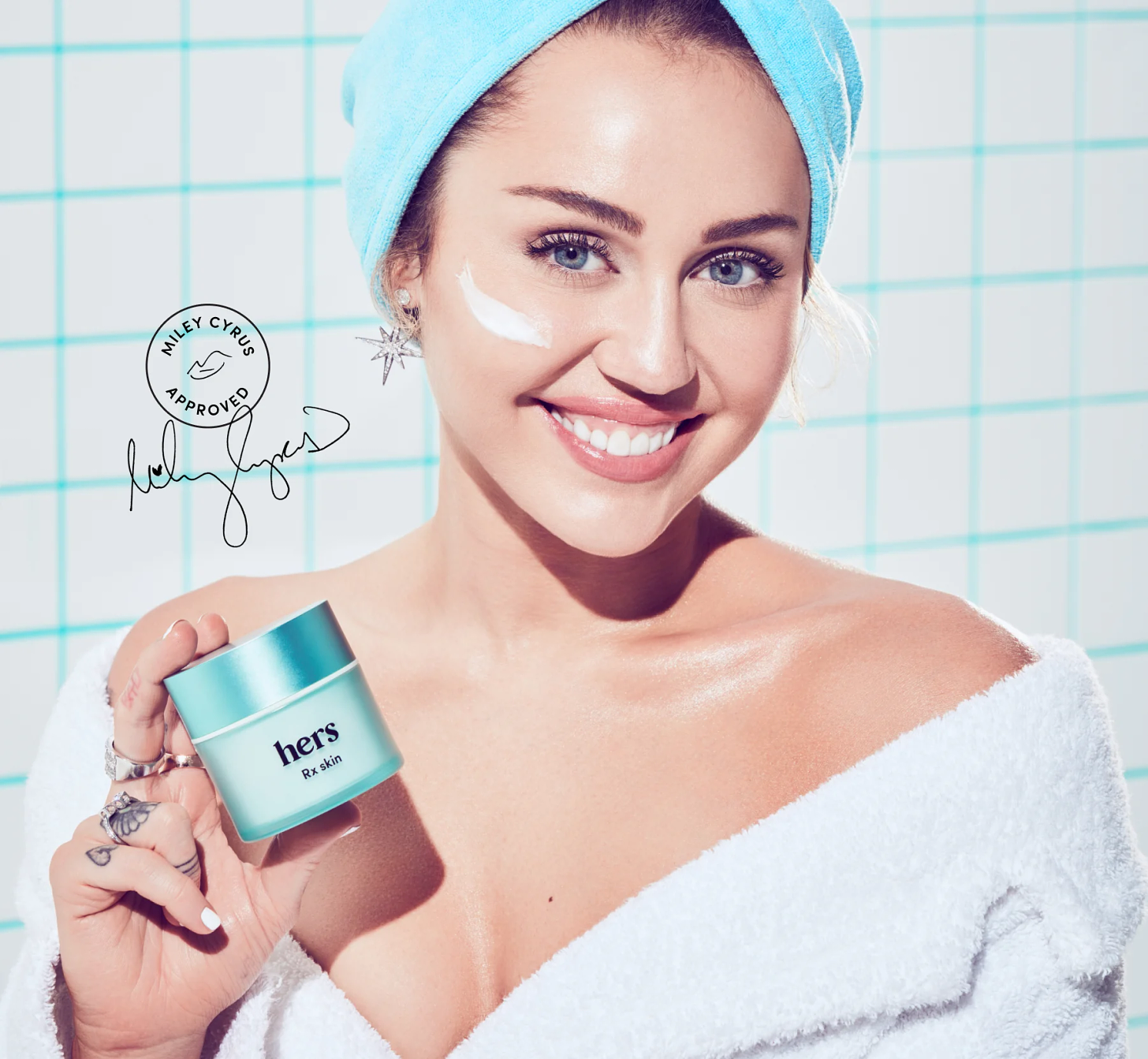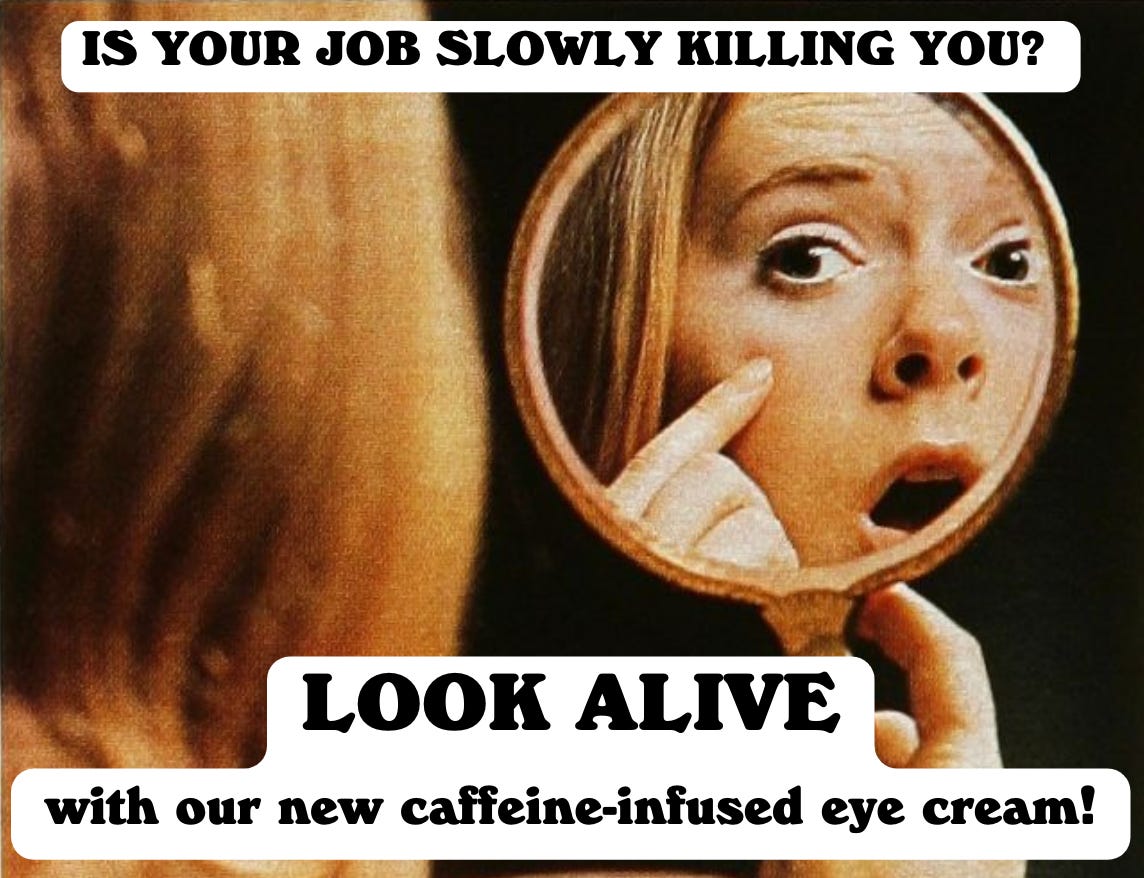"Look Like You Slept 8 Hours!"
How the beauty industry convinces overtired, overworked customers to spend the money they make from the work that makes them tired on eye cream.
Miley Cyrus is wearing a full face of makeup. But, like, natural makeup — the kind of makeup meant to make me think her radiance isn’t the result of makeup at all, but rather, the result of skincare. Skincare from telemedicine beauty brand Hers, to be specific. The skincare product right here in her hand, actually! From behind the backlit screen of my laptop, the 29-year-old Cyrus proffers a jar of prescription-strength goo.
“The truth is, we’re not trying to look 18 again — but looking like we get a solid eight hours of sleep would be nice,” the product copy cooed. “Enter the Anti-Aging Cream.”
Oh, how I hate this marketing scenario. It illustrates the (supposed) end result of a skincare product with a coat of full-coverage foundation, for one. It employs a twenty-something to spout anti-aging claims, for another. But its most egregious offense, I think, is the implication that this face cream is somehow, in some way, comparable to a full night’s sleep.
It is not.
Sleep is an irreplaceable and unreproducible bodily process. It is essential to brain function, heart function, and general alive-ness. If you want to get skin-specific, sleep is a period of regeneration and renewal. This is when UV damage is repaired, old cells are replaced, collagen is produced, wounds are healed, hydration happens, hormones get balanced. Sleep is what makes it possible for the skin to self-cleanse, self-moisturize, self-exfoliate, self-protect, and self-heal. All that, and still: so much about sleep is unknown! Maybe unknowable! It’s a near-mystical thing, really — a state of altered consciousness; a spell conjured by the sun, the moon, your microbes, and a melatonin-secreting gland that Descartes believed to be the seat of the soul. No anti-aging cream or under-eye mask could possibly replicate its effects.
But when has a little thing like the truth ever stopped the skincare industry?
This particular sales tactic is a mainstay in women’s media. Top-ranked articles on the subject of “beauty sleep” include 13 Ways To Fake Looking Like You Got Sleep, 11 Ways To Look Like You Got A Great Night's Sleep, 9 Ways To Wake Up Prettier Than When You Went To Sleep, 6 Ways To Look Like You've Gotten Your Beauty Sleep, and 6 Ways To Wake Up Tired Eyes. All recommend massage tools, brightening moisturizers, face oils, foundations, fillers, Botox, sheet masks, eye serums, concealers, highlighters — skincare and makeup routines that often require hundreds of dollars and hours of effort. Hours that you could spend, you know, sleeping. (The only thing Big Beauty doesn’t want you to apply to your skin? Common sense.)
On some level, the ruse is understandable: Modern living leaves little room to rest. There’s the intangible pressure of productivity culture and the addiction to various doom-scrolling devices. There are the practical challenges of the stagnant minimum wage and the rising cost of living and the crisis of unpaid care work and the nuclear family and rugged individualism. As of 2021, there were 13 million Americans working multiple jobs and millions more pursuing side hustles to make ends meet. Sleep is scarce.
Still, “10 Ways To Look More Awake” is not altruistically offering guidance to those who have to pick up the night shift at job number two just to avoid eviction — it’s offering Juice Beauty Enriching Face Oil to those rich enough to afford luxury skincare. It’s asking you to quiet your body’s health cues with beauty products. It’s suggesting you erase the physical evidence of your labor by performing additional aesthetic labor. It’s convincing overtired, overworked readers to spend the money they make from the work that makes them tired on eye cream that doesn’t make much of a difference. It is dermal disaster capitalism.
“10 Ways To Look More Awake” is not altruistically offering guidance to those who have to pick up the night shift at job number two just to avoid eviction.
“There’s a stigma around caring for yourself, unless it’s attached to capitalism,” Tricia Hersey, the writer and theologian behind The Nap Ministry, tells the Atlantic’s Social Distance podcast. “Then it’s okay. You can pay $200 for a facial, and then you’re taking care of yourself. But if you’re caring for yourself with something as deep as sleep, which is one of our most ancient and primal needs, if you’re doing that in public, caring for your body, that’s shameful. I tie that back to capitalism and to white supremacy and these notions around not seeing humans as divine and not seeing our bodies as belonging to us.”
Hersey notes that people tend to respond to her message of “rest as resistance” with, Who has time to rest? I could never do that. It sounds nice, but no. And it’s a valid critique. Anyone who is not at a point where they can prioritize rest — for any and all of the aforementioned reasons — can at least “start to deprogram around all the systems that have us at this point of sleep deprivation, where we don’t think we are worthy of sleep,” Hersey suggests. Changing how you receive the messages of the hustle economy is the first step (in an admittedly long, long line of harder, more radical, more political, organized steps) toward changing the hustle economy.
In the case of the industry’s claim that sleep can or should be replaced with purchasable skincare products, deprogramming can be as simple as simple math: The items suggested in “13 Ways To Fake Looking Like You Got Sleep,” for example, total $110 — roughly 10 hours of labor for the average American citizen, or six hours of child care from a babysitter. Does it seem reasonable to perform 10 hours of labor to look like you spent eight of them sleeping? (Or rather, to try to look like you spent eight of them sleeping? To try unsuccessfully? Because, again, rest cannot be replicated with retinol eye cream?) No.
My point is: While fitting a full night’s sleep into your schedule may seem impossible, outsourcing that sleep to skincare is not only also impossible, but more impossible, and exploitative — an alternative that not only doesn’t replace sleep, but actively steals sleep via the hours of labor required to make the amount of money required to buy the damn skincare.
Don’t let Miley or marketing copy convince you otherwise.






I have spent much of my life since middle school feeling like a failure at this whole "being a girl" business. I didn't understand how to apply makeup or how to justify spending tons of money on it. I didn't understand getting up early to "put on my face" and do my hair, instead of just, y'know, sleeping another hour (or even two for some folks). I didn't understand why I would use multiple products to care for my skin when washing it with gentle soap, a basic moisturizer from the natural food co-op, eating whole foods and drinking plenty of water seemed to work just as well.
Instead of feeling smarter than the beauty industry, however, I just felt like there was something about being a woman that I didn't get. That I was somehow less successfully female.
This newsletter isn't helping me deprogram my participation in the beauty industry, but it is helping feel less judgmental of myself for never participating much in the first place.
WILD APPLAUSE